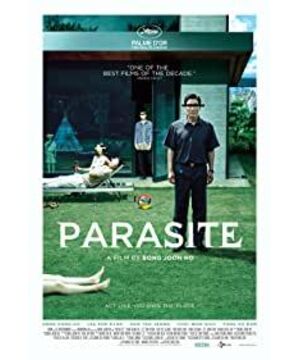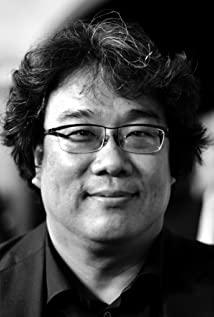I finally saw "Parasite", from the director of "Memories of Murder" Feng Junhao, and the winner of the Cannes Shinco Award. Naturally, I have different expectations for this movie.
"Memories of Murder" is the perfect movie in my mind. It is second to none in the history of Korean film. The plot, characters, rhythm, and various techniques such as transcendence, it is hard to imagine that it is just the second feature work of the director and screenwriter Bong Joon-ho. When it was released in 2003, he was only thirty-four years old, which is limitless.
After the Iranian film "A Farewell" in 2011, I think there is no good movie in the world, and I have been looking forward to another work that can truly be called a "good movie". After the news of "Parasite" appeared this year, I felt this hope.
But the facts are still frustrating. "Parasite" is a suspense film with a high level of completion and neatness, but that's it. I have to ask for something more from this film, no more. Of course, it is far worse than "Memories of Murder", and even worse than last year's "Burning".
I don't think "Burning" is a "good movie", but its literary character is slightly better than "Parasite". The latter has even fallen into the clichés of many commercial movies, especially the first climax of the movie. When the protagonist's family moves in after the rich man goes camping, he can understand that this scene will definitely advance to the end of the rich family suddenly coming home and be caught off guard. From the very beginning of this scene, I was looking forward to whether Feng Junhao could handle it differently, whether it was their enjoyment at the rich's house or the reaction of the rich after returning home. Unexpectedly, from the family eating and drinking at their home, to hiding after the rich went home, and finally arranging a scene where a rich man’s young son suddenly wakes up, everything is normal, and a farce like a home headed kid ends.
Many people talked about the scene in which a family of three returned to the original semi-basement after the end, but I disagreed. This is the "poverty" expressed as a visual spectacle, and the intuitive contrast with the rich family, as if the director pressed my neck and pressed me to the flooded basement, asking me, is it miserable? Poor? This scene was filmed in a disaster film. I went back to my house and complained all over the street, and even arranged a scene of spraying toilet water. In the end, everyone went to the gym to spend the night. It was beautiful and exciting, but it hit this scene. Some touches. It's more like a natural disaster that no one is responsible for.
Yes, "Parasite" is full of various visual spectacles, which makes people feel that this is Park Chan-wook's movie, especially the color of the basement and the shape and temperament of the basement man, which are completely the number of "Old Boy". It’s a pity that the old boy is a completely absurd drama. From the beginning to the end of the film, what he wants is the big opening and closing of the farce. Cut into the absurd plot, which is incomprehensible. What do you want to say? The poor are driven crazy by the rich and society? Crazy to live in a semi-imprisoned basement? Is this really a good form of expression? In such a comparison, the conflict and description of poverty in Li Yu's "Apple" may be a bit higher.
This is the advantage of Korean movies, and it is also a kind of "slow growth." Korean movies are good at creating suspense and crime spectacles. But the combination with realism always makes the movie short of breath. In "Burning", the conflict between the rich and the poor is that the rich like to kill the poor pervertedly? In "Taxi Drivers", the conflict between the government and the people is the search and chase of the plainclothes police? In "Parasite", the conflict between the rich and the poor can't stand their taste? Some people will argue that this is a "symbolic technique", so what does this symbolize? What kind of conflict does it symbolize? In "A Farewell", the conflict between the middle class and the poor is eloquent, and lies are more credible. Before the judicial machine, the words and tempers of the poor are completely at a disadvantage. Such conflicts are very real and contagious. Powerful. But in Korean movies, the real tension of this kind of conflict is probably "The Defender". Unfortunately, the characters are too facial to bear the weight of this movie.
Of course, "Parasite" still has many problems. There are many places where the plot cannot be justified. The prominent way of symbols such as rockery is too deliberate. The "ugly" shaping of the rich family makes people unable to hate them. The hero stabs into the body of the rich, but I don't think it is necessary at all. The director bluntly strengthened the conflict of "taste" in countless places, and finally turned this into a murderous motive, "being back and forth" everywhere, but it is not very empathetic. This movie is like this everywhere. The plot logic is clearly stated, explained thoroughly, and understood, for fear that the audience will not understand or understand, it is a second-rate suspense film technique. After watching it naturally, nothing was left of this movie. More feelings about the gap between the rich and the poor? Sympathy for the poor? Reflections on the rich class? Did not even have the urge to watch the second time. "Burning" can let me watch it twice at any rate. It is the literary temperament of the movie itself that drives me to watch it again, and "Parasite", which has become a commercial film routine, doesn't even have this.
The gap between the rich and the poor is a realist theme, more realistic than the conflict between North Korea and South Korea. It is a major problem in any late-capitalist society and an inexhaustible source of the basic plot structure of the film. The worst, such as "Elysium" and "Battle Angel Alita", is the moment when you want to fight monsters and upgrade their magical skills; better ones, such as "Destined to Heaven", have a vigorous atmosphere, but they are still crime movies. The frame of "Burning" and "Parasite" in South Korea fall into the frame of the suspense film. This reminds me of Kurosawa Akira's sigh, as long as it is a movie, it is American when put in a frame, no matter what story is inside (this is not his original words). I think the reason is the type of movie. "Seven Samurai" is a western movie, "Random" is a Shakespearean stage play, and "Rashomon" is a detective suspense. Kurosawa is a top-level master, and he must understand the profound limitations of genre films on film expression, and also understand how deep-rooted genre films are as a set of mindsets in the film industry system.
Therefore, the only thing that can break through the genre is "realism." Real life is different. By exposing real life, American films can also make new ideas, like "The End of Alert", which looks like a typical crime film. All have new ideas and feelings. Nothing is more contagious than reality, but this especially places extremely high demands on the skill of the screenwriter. It is actually very difficult to compose attractive reality, especially daily life. I want to fall into the stereotypes of genre movies, because that is an easy way. Making a realistic movie with a local style is the hard way, and it is also the way to make a really good movie return to our lives.
"Parasite" succeeded, ignited the global market, won the grand prize, and on the surface it was glorious. But he also failed the most completely. It reminds me of another very realistic movie "Outstanding Citizen" (the emotional scene with the old lover and the final shooting is the movie's failure). At the beginning, the protagonist was awarded the promise In his speech at the Bell Prize, he said something like this: "I feel very sorry to accept such a canonization. I believe that such unanimous recognition and praise have a direct and unequivocal relationship with the decline of an artist. ."
Box office, popular word of mouth, awards praise, this is the realism theme, and the real reason for the decline of good movies, this is nothing profound.
View more about Parasite reviews










